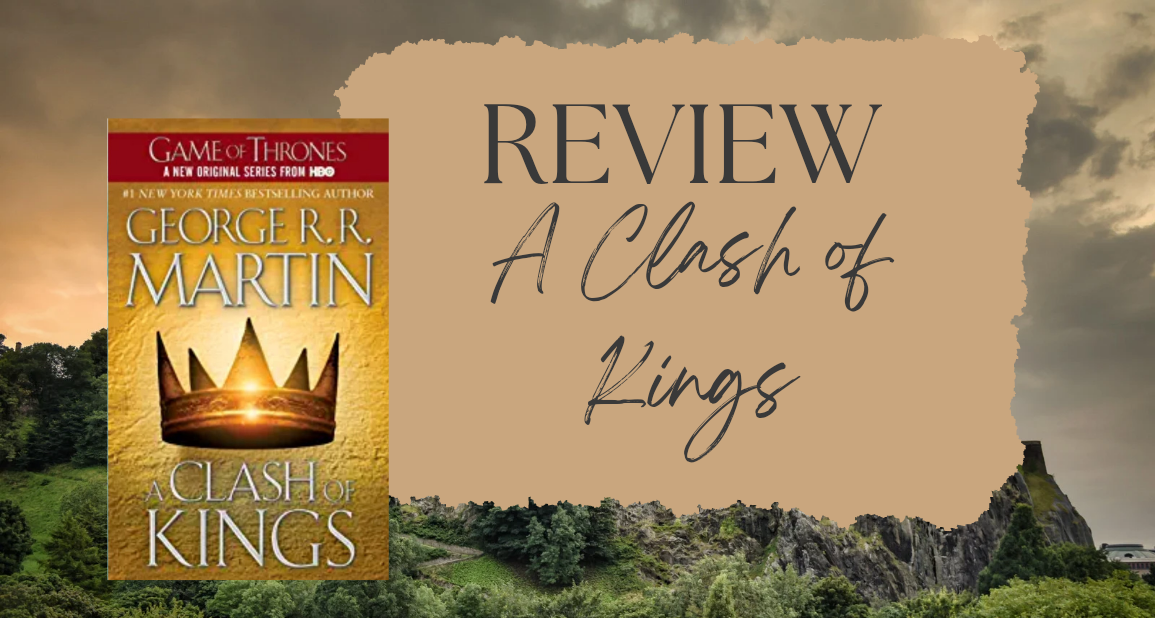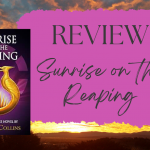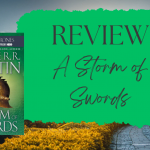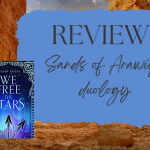Review | A Clash of Kings (book 2)

Warning: A Clash of Kings is the second book in the A Song of Ice and Fire series, therefore this review will contain spoilers for book one. In case you haven’t read A Game of Thrones (the first book) yet, I recommend you to not continue reading this review. You might want to check out my review for A Game of Thrones instead.
Summary:
After King Robert’s death, chaos reigns all across Westeros. Word has spread that King Joffrey is not actually King Robert’s son and thus not the rightful heir to the iron throne. As a result, both of Robert’s brothers claim the crown for themselves. Meanwhile, Robb Stark has been named the King of the North by his followers and continues fighting the war against the Lannisters to free his sisters and secure his new position.
While war is waged all across Westeros and brings death and destruction everywhere, Daenerys Targaryen is planning her return to Westeros to seize the throne that once belonged to her family and in the north, ancient powers are returning.
Review:
This book is a great continuation of the story we were told in A Game of Thrones, covering all the aspects I loved about it and expanding on the world, the characters and the events of book one. Like the first book, it definitely wasn’t an enjoyable read in that sense, but the story had me hooked and I couldn’t put the book down.
I loved getting to spend more time with the characters I have grown to love (or hate, depending on who we are talking about … looking at you, Joffrey) over the course of the first novel and to see how their story continues. At the same time, there were also many new characters introduced, expanding the scale of the story from the conflict between Starks and Lannisters to the “clash of kings” the book is named after. One thing I particularly appreciate about this series, is that the world isn’t as black and white. As I mentioned in my review of A Game of Thrones, Westeros doesn’t really have a moral code and while there are certain practices that are frowned upon, there are also many that are seen as completely normal and acceptable which from today’s perspective are completely immoral and horrible. Thus, each character has a different interpretation of what is morally acceptable and what isn’t and even the “good” ones do questionable things at times, while the villains also have a human side and aren’t purely evil. This also gives the conflict more complexity since it isn’t always easy to distinguish between good and evil.
The story does get a little more complex with more parties involved in the conflict and more characters to keep track of, however I didn’t have any problems understanding what was going on, even if I sometimes didn’t fully remember where each person was at the moment or what the characters had discussed with each other. If the same happens to you, don’t worry! However, I do recommend to pay close attention when it is explained which houses or ships belong to which side before a battle because it saves you some confusion… I briefly wondered during one battle why people from the same side were attacking each other and thought that maybe some people had defected and were now fighting for the enemy, when in reality they were enemies from the beginning.
When reading the first book I wasn’t really a fan of books with multiple POVs (even though I knew it was necessary to tell this kind of story) but now it has really grown on me. It is quite interesting to see different parties plotting and their evaluation of the events and it also gives the story more depth as it isn’t as focused on one side and allows the events to unfold more freely instead of forcing something spectacular to happen to the protagonist because they are the centre of the story. The variety of characters also show different perspectives on the same issues, each regarding the situation from their position with their interests and values in mind. Most of all, the reader is able to experience what is happening in different parts of Westeros (or in case of Daenerys, Essos) to different characters and which individual struggles each of them is faced with. In this book, even more than in A Game of Thrones, the characters are scattered all across the country and are all facing different circumstances. The only downside is, that including so many characters also means that we only get to spend a limited amount of time with each of them and it can sometimes be frustrating if you desperately want to know how the story of a certain character continues and have to wait one hundred pages until their perspective is featured again. However, this can’t really be avoided because the alternative of using less different perspectives or alternating them in a certain order wouldn’t work either, so I guess it is still handled in the best way.
One of my favourite parts of the series is the struggle for power and the political intrigue going on (although I don’t appreciate it when it is the reason my favourite character dies… #NedStark) which was also a central part of A Clash of Kings. While it is sometimes a little difficult to keep track of each character’s position (especially at court where everyone seems to be playing their own version of the “Game of Thrones” and no one seems to be who you think they are) it is fascinating to see how everyone tries to find a way to be successful in their plans. As Cersei said in the first book “If you play the game of thrones, you either win or you die. There is no middle ground.” (at least something along the lines) and the characters know that it isn’t just about whether or not they sit on the throne, their life depends on their success.
The story had quite some turns of events I didn’t see coming (although I have to admit I am really bad at picking up on the hints, so that might only be me…) and following the characters on their journeys and through their struggles was a “great” experience, lacking a better word to describe the feeling. It was definitely never boring and just like the characters, the story with its various aspects and facets didn’t disappoint. I am definitely curious to see how the story will further unfold, although I am also a little scared of what will happen and seeing which of my favourite characters might not make it to the end… The fantasy part of the story was also developed further, with magical creatures such as Dany’s dragons playing a more central part in the story, as well as some new supernatural elements being introduced, which will most likely still play a greater role in the story to come.
All in all, if you loved A Game of Thrones, I cannot recommend you this book enough. It delivers on all the aspects that made A Game of Thrones the reading experience it is and develops the ruthless and yet fascinating world of Westeros and Essos, as well as its inhabitants further, allowing you to witness the conflict unfold and discover new sides to the already familiar world.
Things to consider before reading:
If you were fine reading the first book in the series, you should probably also be fine with this one. However, if you have any specific triggers I still recommend you to double-check before you continue reading since this book might feature different or additional triggering topics than the first one. As for the first novel, I would rather stay away from the series altogether if you have any triggers since this series is quite violent and doesn’t filter its contents, therefore there are many questionable and possibly triggering things happening.
Disclaimer: This should serve solely as a guide when deciding whether or not to read this book. I cannot guarantee that this list is complete. If you are triggered by something or want to avoid certain topics, please make sure to double check.
Feel free to share your opinion on the book in the comments. I would love to hear what you think about it and whether you liked it!
Please remember to keep the comments spoiler-free or add a Spoiler Alert beforehand so everyone has the opportunity to enjoy the reading experience without already knowing everything that happens.




Thanks!
You’re welcome 🙂